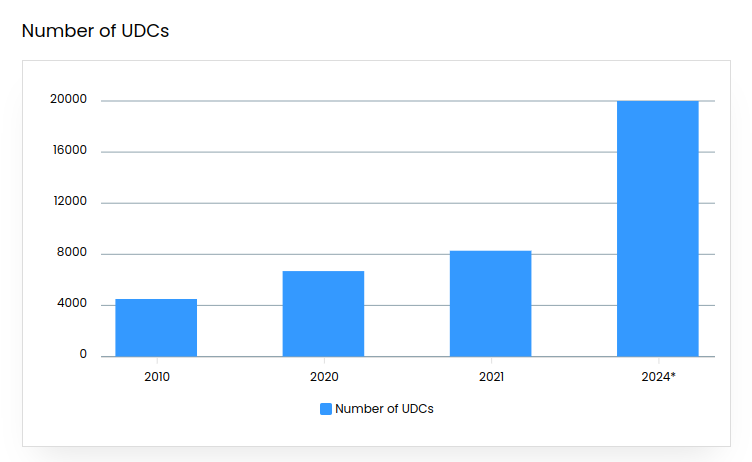12 March, 2023
What is Smart Bangladesh really?
What was a dream on March 7, 1971—Independent Bangladesh—became a reality on December 16, 1971....

Digitalization of Bangladesh’s government services have imposed a concern of digital divide between the rural and the urban areas. Union Digital Centers have been serving the rural population and mitigating the risk of a digital divide.
The majority of people in Bangladesh were unable to access government and other services because of customary paperwork and regional obstacles. The poorest people in society, who comprise 24.1% of the population, frequently lack access to basic healthcare services because of a number of issues, such a low value placed on their needs. On the other hand, 70.3% of rural households do not have internet access but the government has already digitized the ongoing services and procedures in Bangladesh, in order to eliminate bureaucratic red tapes and increase efficiency. This has imposed the concern of a digital divide between urban and rural populations. To deliver the government services at the root level the government came up with a new vision of decentralizing digitization for serving the public.

The Digital Bangladesh Vision 2021, e-governance initiatives, and the Access to Information (a2i) Programme are a few of the projects the Bangladeshi government has been working on to enhance public service delivery and advance e-governance. One of the main achievements of the Digital Bangladesh vision are the Union Digital Centres (UDCs), which offer all private and public services to residents in the rural areas and reduce corruption by streamlining and improving public service delivery procedures. Additionally, UDCs provide a twofold benefit to society by providing essential services including social safety net programmes, online birth registration, and test registration.
Union Parishad is one of the most ancient local governance bodies in Bangladesh, the closest local government to represent the people. The Union Parishad now has new dimensions due to the establishment of the Union Digital Centre, an IT-based service center, now an integral part of the Union Parishad. The Honorable Prime Minister officially opened a total of 4501 Union Digital Centre (UDC) throughout the country on November 11, 2010. The number of UDCs sharply rose to 6686 in 2020 and the number of services delivered by the UDCs increased to 270. As of November 2021, the country had 8280 UDCs delivering more than 300 services. At this rate, according to a2i report, it is expected that the number of digital centers will increase to more than 20,000 and the number of services to more than 1500 in 2024.

UDC’s primary objective is to strengthen the Union Parishad in order for decentralized governance. Furthermore, by eliminating technological barriers and integrating all individuals into the contemporary information flow system, these centers have the potential to significantly increase public access to public-private information and services.
UDC AT A GLANCE
300+ Services
76.6 % User Satisfaction
78.15% Working Hours Saved (Average 17450.2 Working Hours)
16.55% Expenditure Saved (13.1 K on Average)
17.38% Travel Expenditure Saved (134.2 Times on Average for the Citizens)
The UDCs seek to provide services to millions of rural people and assist those in need at the grassroots level. Under the motto “Service at Doorsteps,” Digital Centres have enabled over 300 services that enhance the recipient’s confidence by transforming public service through digital means. Citizens’ pleasure is increased via digitizing public and private services, which eliminates Time, Cost, and (number of) Visit (TCV) and increases confidence in e-government services. As of the end of November 2022, 76.6% of service recipients reported that they were satisfied with the services they have received at the UDCs. It’s worth mentioning that as of January 2022 these centers have provided a total of 62.5 crore services, which saved an average of 17450.2 working hours(78.14%), saved 16.55% of the expenditure and 134.2 times (17.38%) travel expenditures on the citizens’ end. The UDC was able to gauge improved results from its services and win the trust of the populace thanks to the timely policy that surpassed the changing requirements of the people.
MICRO ENTERPRISE MODEL OF UDC
16,500 UDC Entrepreneurs
54% Aged between 31 and 40
In Bangladesh, the public-private partnership (PPP) model of micro-enterprise has been utilized in the creation of UDCs. The UDCs are de facto managed by a male and a female entrepreneur, and their modest size makes them “micro” enterprises. The capacity to collaborate with various private-sector players as well as public-sector organizations in order to deliver services at a reasonable price gives birth to the entrepreneurial role. In Bangladesh, under the spirit of micro-entrepreneurship propelled by a PPP structure, UDCs integrate commercial services in addition to government services. With the slogan “Serving with heart,” 16,500 entrepreneurs, including over 5,200 women entrepreneurs, are now employed at the Digital Centre. The number of entrepreneurs between the ages of 31 and 40 is relatively higher at 54%.
Digital Centre Entrepreneur
MONTHLY AVERAGE INCOME OF UDC ENTREPRENEURS PRE-ENGAGEMENT 7000 BDT
MONTHLY AVERAGE INCOME OF UDC ENTREPRENEURS POST-ENGAGEMENT 31000 BDT
The Union Digital Centre has been operating as a facility facilitator. Two entrepreneurs—a male and a female—work in each center. Women now have easy access to the center since there are female entrepreneurs, given Bangladesh’s unfortunate gender construct which causes discomfort for many rural women to seek service from a male service provider. Entrepreneurs do not invest in companies or hire staff; instead, they make their living by charging the public for their services. Information and service centers have invested in both the government and businesses since they are run on the public-private partnership model. While this is going on, a few business owners are doing great by overcoming the challenging circumstances and making over Tk 50,000 a month by offering a range of public and private e-services to the public.
A study conducted by a2i and UNDP shows the average income of a UDC entrepreneur has soared from 7000 per month on an average to 31000.
“I am in the third year of honours. In addition to studying, I work in the digital centre. I earn a good amount from here. Here I work independently. The more I work, the more my income increases. Through this, it is possible to earn up to Tk 2 lakh per month. Again, I do not have to pay any fee to the chairman’s office from my income.”
MOHAMMED AL-AMIN, A UDC ENTREPRENEUR
Services Provided by UDCs
Accessibility
Since the Union Digital Centre opened, 60 public and private services are now easily accessible, reasonably priced, and hassle-free for regular people through UDC. Almost 625 million services have been rendered since the program’s inauguration.
Government Services
The important government services of UDC are:
Private Services
Private services provided by the UDC are:
Computer Training Program 52,000
Trainees between November 2010 and March 2014
UDC’s computer training programme is among its most significant offerings. In order to create a civilization that is dependent on technology, this project is crucial. Currently, 3,773 EDCs use multimedia projectors to offer inexpensive computer instruction. UDC provided computer instruction to roughly 52,000 school children and young people between November 2010 and March 2014.
State Insurance Company, Jiban Bima Corporation, launched life insurance services in 2,768 UDCs around the nation in an effort to connect with the villagers. 36 thousand users have used the service thus far.
Mobile banking operations (Dutch Bangla, Trust, One Bank, and Bikash) are being carried out across the nation in order to provide financial services to underprivileged grassroots people. Sixty thousand users have used the service thus far.
The Rural Electrification Board (REB) has so far set up bills for rural energy through 727 UDC in order to deliver services to people’s doorsteps.
The Health Directorate has partnered with 30 Union Digital Centres to launch telemedicine services, bringing healthcare services directly to the impoverished rural populace. In addition, there are around 500 UDC health camps offered.
A poor farmer’s ability to obtain timely and accurate information from UDC has improved agricultural output and income. It saves time, labor, and money for the average resident to apply for duplication of land without having to visit the upazila or district office. A student in a village can use SMS to apply for admission to a university inside his area. English may be learned by an immigrant worker through digital media. Even in remote regions, an average individual may receive medical treatment via video chats. It just takes a few seconds for anyone impacted by climate change to learn about local disaster forecasts.
Women Empowerment
Every month, over 4,500 UDCs provided livelihood assistance to 3.91 million disadvantaged clients, 25 percent of whom were women.
Migrant Workers Benefit
Over 2.2 million prospective migrant workers, including 40,000 female migrant workers, registered online to seek international employment through UDCs.
Financial Services
More than 78,000 people where 70% of them are women, got access to mobile banking services and made BDT 113 million (USD 1.39 million) in transactions.
Youth Development
More than 45,000 young people, 70% of whom are women, received computer literacy instruction and skill development training in the digital world.
Administrative Problems Solving
The UDC blog, which provides a venue for cooperative problem resolution and handles many administrative issues far more swiftly than typical bureaucratic channels of the government, has over 150,000 entries published.
Digital Progress
Nearly every UDC has a home page on the government mega-portal, which gets one million page views every day. Most of the content on these pages was created by UDC entrepreneurs.
Awards and World Wide Recognition Received by UDC
Union Digital Centres (UDCs) are one-stop shops that provide rural residents in Bangladesh with services. These represent a key accomplishment of the government’s Digital Bangladesh goal, which aims to use them to offer rural residents all public and private services. The range of online solutions increased as the necessity for in-person communication between a service provider and a recipient decreased, reducing corruption. As a result of UDCs, “chances of becoming victims of corruption” have been lowered, according to a 2017 study report by Transparency International Bangladesh (TIB).
Through the provision of three essential services—online birth registration, exam registration, and the social safety net programme (SSNP)—UDCs are creating a double return for society for every taka spent, according to new research evidence for Bangladesh Priorities by the Copenhagen Consensus and BRAC Institute of Governance and Development (BIGD).
UDC’s adventure began in front of the Doorsteps service community. Since the founding of UDC, information has been able to freely flow across society and the government system, allowing services to be provided to individuals at their doorstep rather than forcing them to knock on people’s doors. The public’s empowerment depends in part on the unrestricted flow of information. By promoting economic growth and well-being, the Digital Centre of the Unions, Upazilas, and City Corporations has evolved into the citizens’ go-to hub for e-services.

12 March, 2023
What was a dream on March 7, 1971—Independent Bangladesh—became a reality on December 16, 1971....

12 July, 2023
With the rising accessibility of the internet, online platform usage in Bangladesh has been increasing...

26 November, 2020
As more services are delivered online by the private sector, governments must follow suit and...